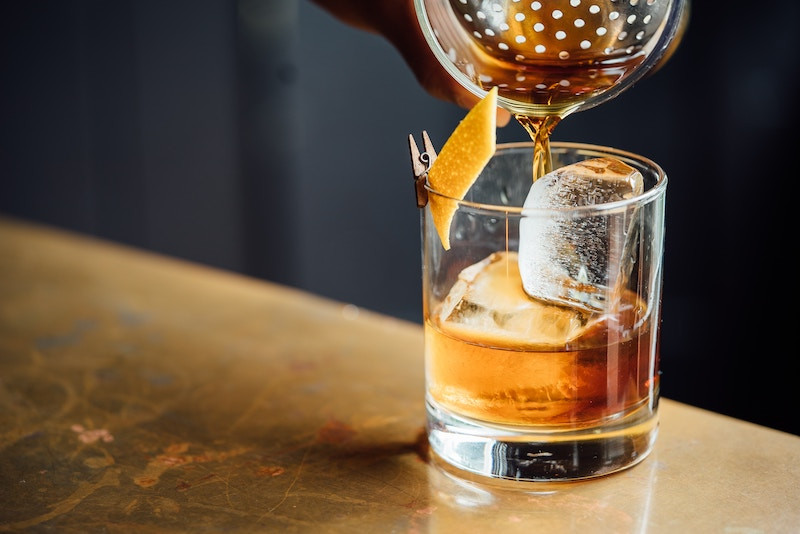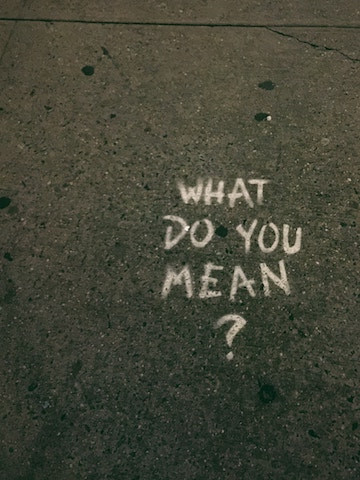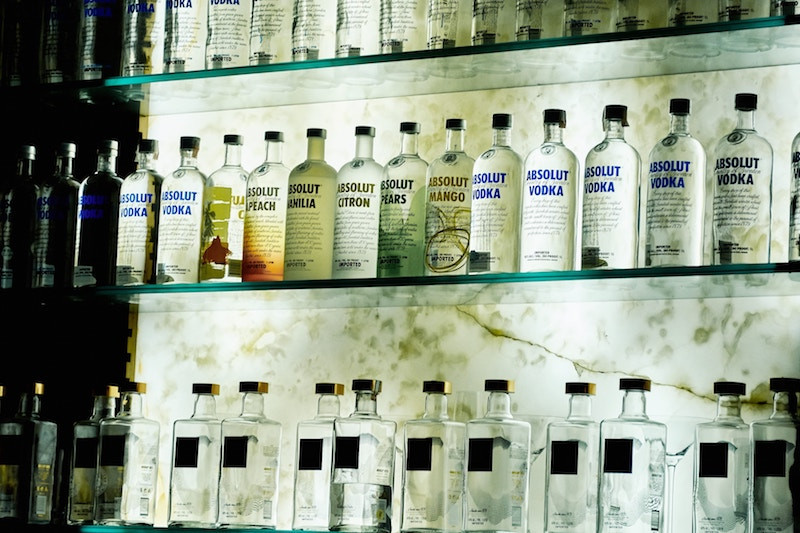‘Light liquor vs. dark liquor’ might sound like a debate from a movie scene, but as a doctor, it’s a question I encounter surprisingly often. While it might seem off-topic for a site focused on healthy eating, the persistent belief that light liquor is somehow ‘healthier’ than dark liquor is a misconception that needs to be addressed.
We live in a world where perceptions are often skewed by superficial differences, and it seems alcohol isn’t immune to this ‘color complex.’ Growing up, I was taught to judge alcohol by its taste and experience, not its hue. I even remember using a Crown Royal bag as a piggy bank in my childhood – color certainly wasn’t a factor then!
However, I was recently taken aback when someone questioned my choice of a dark, bourbon-based ‘Old Fashioned,’ implying it was somehow less healthy. This experience highlighted the pervasive nature of the light vs. dark liquor myth and compelled me to share my story and shed light on this so-called “Doctor Light Controversy.”
My Old Fashioned and the Bar Encounter: Unpacking the “Doctor Light Controversy”
 Alt text: Doctor holding an Old Fashioned cocktail in a bar, illustrating the light versus dark liquor controversy.
Alt text: Doctor holding an Old Fashioned cocktail in a bar, illustrating the light versus dark liquor controversy.
Recently, after a long day at the hospital, I was relaxing with a colleague at a local bar, The Promontory. We were engaged in typical doctor talk – discussing procedures, teaching residents, and the ever-delightful bowel prep routines. Suddenly, I heard someone call out, “Dr. McDonald!”
Turning around, I recognized a person from the hospital approaching. As they came closer, I noticed their gaze fixed on my drink. The first question they asked was, “What are you drinking?” “An Old Fashioned,” I replied, even adding that it was quite good.
Their reaction was unexpected. A blank stare, a moment of hesitation, and then they blurted out:
Doc, I can’t believe you’re drinking dark liquor—you should know better.
Random person at the bar
I was genuinely confused. Was it the quantity? Was he implying a doctor shouldn’t be seen drinking at all? His tone was certainly judgmental.
I responded, thinking he was concerned about overindulgence, “It’s just one drink.”

But no, his issue wasn’t moderation. It was the dark bourbon in my Old Fashioned. He confidently declared that he “never drinks dark liquor because light liquor has fewer calories.” He even doubled down with, “As a doctor, you should know better.”
My colleague and I exchanged glances, both of us surprised by this unsolicited and frankly misinformed health advice. It was clear this person was a firm believer in the ‘skinny drink’ dogma.
At that point, I felt compelled to respond with some facts, to address this “doctor light controversy” head-on. It was time to bring some evidence-based knowledge to the bar.
3 Key Facts to Dismiss the “Light Liquor is Healthier” Myth
 Alt text: Assortment of light and dark liquors in glasses, highlighting the visual difference but questioning health differences.
Alt text: Assortment of light and dark liquors in glasses, highlighting the visual difference but questioning health differences.
Many people mistakenly believe that light liquors are inherently lower in calories and healthier than their darker counterparts. This is a myth. Here are three critical points to understand about alcohol and health, regardless of color:
1. Calorie Content: Alcohol is Alcohol, Calories are Calories
The notion that light liquor is significantly lower in calories is a widespread misconception. While it’s true that both light and dark liquors are naturally carbohydrate-free, the calories in alcoholic beverages come from the alcohol itself, not from carbohydrates.
Pure alcohol contains approximately 7 calories per gram. Therefore, the calorie content of any liquor is primarily determined by its alcohol content (ABV – alcohol by volume). “Stronger” liquors, meaning those with a higher ABV, will generally contain more calories, regardless of whether they are light or dark.
Furthermore, when considering mixed drinks and cocktails, the calorie count can significantly increase due to added sugars from juices, sodas, syrups, and other mixers. These additions contribute far more to the overall calorie content than any inherent difference between light and dark base liquors.
2. Health Risks: Alcohol’s Impact is Colorblind
 Alt text: Doctor examining liver scan, emphasizing the health risks of alcohol consumption, irrespective of liquor color.
Alt text: Doctor examining liver scan, emphasizing the health risks of alcohol consumption, irrespective of liquor color.
As a gastroenterologist, I’ve witnessed firsthand the detrimental effects of excessive alcohol consumption on the human body. From patients with jaundice due to alcoholic cirrhosis to those critically ill with acute alcoholic hepatitis, the damage is undeniable. In severe cases, liver transplantation becomes the only option.
The color of the alcoholic beverage plays absolutely no role in determining the risk of developing these severe health conditions. The critical factors are the frequency of alcohol consumption, the quantity consumed per occasion, and the overall concentration of alcohol ingested over time.
Beyond liver disease, frequent alcohol consumption is linked to an increased risk of various cancers. A comprehensive review article published in PubMed highlighted this connection:
Heavy alcohol consumption (i.e., ≥4 drinks/day) is significantly associated with an increased risk of about 5-fold for oral and pharyngeal cancer and esophageal squamous cell carcinoma, 2.5-fold for laryngeal cancer, 50% for colorectal and breast cancers, and 30% for pancreatic cancer. [1]
While some earlier concerns suggested dark liquors might pose a slightly higher risk for oral and pharyngeal cancers, subsequent research has debunked this notion. One study published in the International Journal of Cancer concluded:
This analysis provides no support for the notion that dark liquors are more carcinogenic than light liquors or that non-ethanolic ingredients of alcoholic beverages are major contributors to the excess risk of oral and pharyngeal cancer. [2]
The scientific consensus is clear: the health risks associated with alcohol are primarily related to ethanol itself, not the color of the drink.
3. Intoxication: Getting Drunk is About Ethanol, Not Hue
 Alt text: Person looking intoxicated and holding a drink, illustrating that both light and dark liquor can cause intoxication.
Alt text: Person looking intoxicated and holding a drink, illustrating that both light and dark liquor can cause intoxication.
The intoxicating effects of alcohol – feeling buzzed, tipsy, or drunk – are caused by ethanol and the metabolic byproducts your body produces when processing alcohol. The color of the liquor is irrelevant in this process. Whether you’re drinking vodka, gin, whiskey, or rum, it’s the ethanol content that leads to intoxication.
However, there is a slight caveat related to dark liquors and hangovers. Dark liquors contain congeners, which are byproducts of the fermentation and aging process, particularly when alcohol is aged in barrels. Congeners have been linked to an increased likelihood and severity of hangovers. (For more details, you can read my post on hangover remedies: Cure Hangovers).
Regardless of hangover potential, both light and dark liquors will lead to intoxication if consumed in sufficient quantities. And as a crucial reminder in today’s world of ride-sharing services, drinking and driving is utterly unacceptable and preventable.
The Bottom Line: Focus on Moderation, Not Color
- Drink in Moderation: The most important advice regarding alcohol consumption is to drink in moderation, regardless of the type of alcohol.
- Mind the Alcohol and Sugar: Pay closer attention to the overall alcohol content and added sugars in your drinks rather than fixating on the color of the liquor.
- Informed Choices: Make informed decisions about alcohol consumption based on facts, not myths.
If you’re interested in further reading on related health topics, you might find my article on red wine and headaches insightful.
Your Actionable Steps:
- Share Your Thoughts: Leave a comment below and share your experiences or thoughts on this topic.
- Spread the Knowledge: Share this article with anyone who might benefit from debunking the light vs. dark liquor myth.
- Join Our Community: Subscribe to our email list and follow us on social media for more evidence-based health information.
- Explore More: Check out our other articles for a wealth of doctor-backed health and wellness advice.
